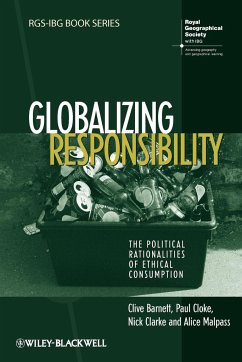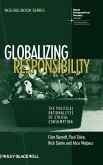"Globalizing Responsibility: The Political Rationalities of Ethical Consumption presents an innovative reinterpretation of the forces that have shaped the remarkable growth of ethical consumption. Develops a theoretically informed new approach to shape our understanding of the pragmatic nature of ethical action in consumption processes Provides empirical research on everyday consumers, social networks, and campaigns Fills a gap in research on the topic with its distinctive focus on fair trade consumption Locates ethical consumption within a range of social theoretical debates -on neoliberalism, governmentality, and globalisation Challenges the moralism of much of the analysis of ethical consumption, which sees it as a retreat from proper citizenly politics and an expression of individualised consumerism"--
Interest in the ethics and politics of consumption is rising steadily. But many questions still remain about the complex motivations and practices involved in being an 'ethical consumer'. Globalizing Responsibility: The Political Rationalities of Ethical Consumption presents an innovative reinterpretation of the forces that have shaped the remarkable growth of ethical consumption. The book challenges the claim that this phenomenon reflects an increase in individualism and a retreat from proper politics. Using detailed qualitative empirical cases of ethical consumption campaigns, the book investigates the practical strategies used to encourage various ethical consumption activities by ordinary people. First, it looks at the way in which discourses of responsibility and repertoires of consumerism are deployed by activists to enrol support for global campaigns around fair trade, environmental issues, and human rights. And then it looks at how ordinary people engage critically as citizens, not just as consumers, . These two interwoven strands reveal the pragmatic dynamics of ethical action in consumption processes and point to important new directions in understanding the contemporary politicization of consumption. Globalizing Responsibility: The Political Rationalities of Ethical Consumption represents a valuable new contribution to our critical understanding of the politics and ethics of consumption, and to the wider political and academic debates on citizenship, participation, and subjectivity.
Hinweis: Dieser Artikel kann nur an eine deutsche Lieferadresse ausgeliefert werden.
Interest in the ethics and politics of consumption is rising steadily. But many questions still remain about the complex motivations and practices involved in being an 'ethical consumer'. Globalizing Responsibility: The Political Rationalities of Ethical Consumption presents an innovative reinterpretation of the forces that have shaped the remarkable growth of ethical consumption. The book challenges the claim that this phenomenon reflects an increase in individualism and a retreat from proper politics. Using detailed qualitative empirical cases of ethical consumption campaigns, the book investigates the practical strategies used to encourage various ethical consumption activities by ordinary people. First, it looks at the way in which discourses of responsibility and repertoires of consumerism are deployed by activists to enrol support for global campaigns around fair trade, environmental issues, and human rights. And then it looks at how ordinary people engage critically as citizens, not just as consumers, . These two interwoven strands reveal the pragmatic dynamics of ethical action in consumption processes and point to important new directions in understanding the contemporary politicization of consumption. Globalizing Responsibility: The Political Rationalities of Ethical Consumption represents a valuable new contribution to our critical understanding of the politics and ethics of consumption, and to the wider political and academic debates on citizenship, participation, and subjectivity.
Hinweis: Dieser Artikel kann nur an eine deutsche Lieferadresse ausgeliefert werden.
"Globalizing Responsibility: The Political Rationalities of Ethical Consumption presents an innovative reinterpretation of the forces that have shaped the remarkable growth of ethical consumption." (Breitbart.com: Business Wire, 29 November 2010)"Based on original research and innovative thinking, this profoundand insightful book challenges conventional thinking about 'ethicalconsumption.' Approaching the subject as a distinctive form ofpolitical mobilisation, Globalizing Responsibility shows howour everyday consumption practices are related to wider narrativesof social justice and collective responsibility."
--Peter Jackson, University of Sheffield
"By viewing ethical consumption patterns as a politicalphenomenon, the authors deliver a far deeper understanding of thisgrowing movement than a whole raft of marketing and businessliterature which has gone before."
--Rob Harrison, Ethical Consumer Magazine
--Peter Jackson, University of Sheffield
"By viewing ethical consumption patterns as a politicalphenomenon, the authors deliver a far deeper understanding of thisgrowing movement than a whole raft of marketing and businessliterature which has gone before."
--Rob Harrison, Ethical Consumer Magazine








